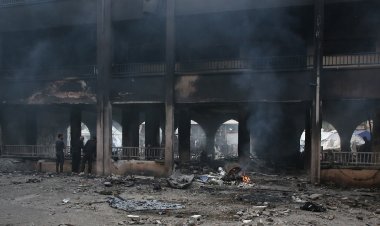Asia News Roundup: South Korea Records Hottest Year in Half a Century as 2024 Concludes, and Additional Stories
Catch up on some noteworthy stories from across Asia that you might have overlooked this week.

2004 was South Korea's hottest year in half a century
In 2024, South Korea experienced its hottest year in 50 years, with a nationwide average temperature of 14.5 degrees Celsius, marking the warmest year since 1973, according to a report from the Korea Meteorological Administration released on Tuesday. The country recorded 103.6 abnormally warm days based on daily low temperatures and 76.7 such days based on daily highs. Abnormally warm days are characterized by temperatures that fall outside the 10 percent range of historical averages for that time of year. The average summer temperature for 2024 reached 25.6 degrees Celsius, making it the hottest summer since 1973 and 1.9 degrees Celsius warmer than previous years.
Tokyo gets Japan's second baby hatch
On Monday, a Tokyo hospital opened Japan's second "baby hatch," allowing parents with unwanted pregnancies to place their infants safely to prevent abandonment in hazardous circumstances. Babies up to four weeks old can be placed in a basket in a discreet area of the hospital run by the Sanikukai Foundation. This facility follows the Jikei hospital in Kumamoto Prefecture, which established a similar service in 2007. The initiative, described as an "emergency, last-resort measure" to save lives, was discussed by Hitoshi Kato, head of Sanikukai Hospital, who noted, "There are still mothers and babies with nowhere to go." Since its inception, Jikei's baby hatch has reportedly accepted 179 babies and toddlers as of May last year.
Dozens injured in Malaysia after gas pipeline fire
In Malaysia, dozens were treated in hospitals following a large fire at a gas pipeline operated by Petronas, the state energy company. The blaze, which occurred in Puchong, near Kuala Lumpur, sent flaming debris falling and shattered windows. Authorities confirmed that the fire has been put out, though its effects have impacted at least 305 people, including those displaced from about 190 damaged homes. Prime Minister Anwar Ibrahim stated that both the state government and Petronas would take full responsibility for the restoration efforts, which could take up to a year.
Thailand's economic activity slows in February
Thailand's economic activity showed signs of a slowdown in February due to declines in manufacturing and services, as reported by the central bank. Officials are monitoring potential impacts on the tourism sector following an earthquake in the region last week. Tourism, a significant economic driver, also experienced a decline in February, with reports indicating that 1 million Chinese tourists visited Thailand during the first two months of the year, a 12 percent decrease from 1.18 million in the same timeframe in 2024. The bank noted that the earthquake, which originated in Myanmar and caused a skyscraper under construction in Bangkok to collapse, could further undermine tourism. "The earthquake may affect tourism confidence and public spending, but it still needs to be assessed," said Bank of Thailand Senior Director Pranee Sutthasri during a news conference. The earthquake occurred just ahead of "Songkran," the Thai New Year celebrated next month, which is a significant draw for foreign tourists. In February, the number of foreign tourists fell by 13.9 percent from the previous month, while manufacturing declined by 1 percent.
Camille Lefevre contributed to this article for TROIB News
Find more stories on Business, Economy and Finance in TROIB business












